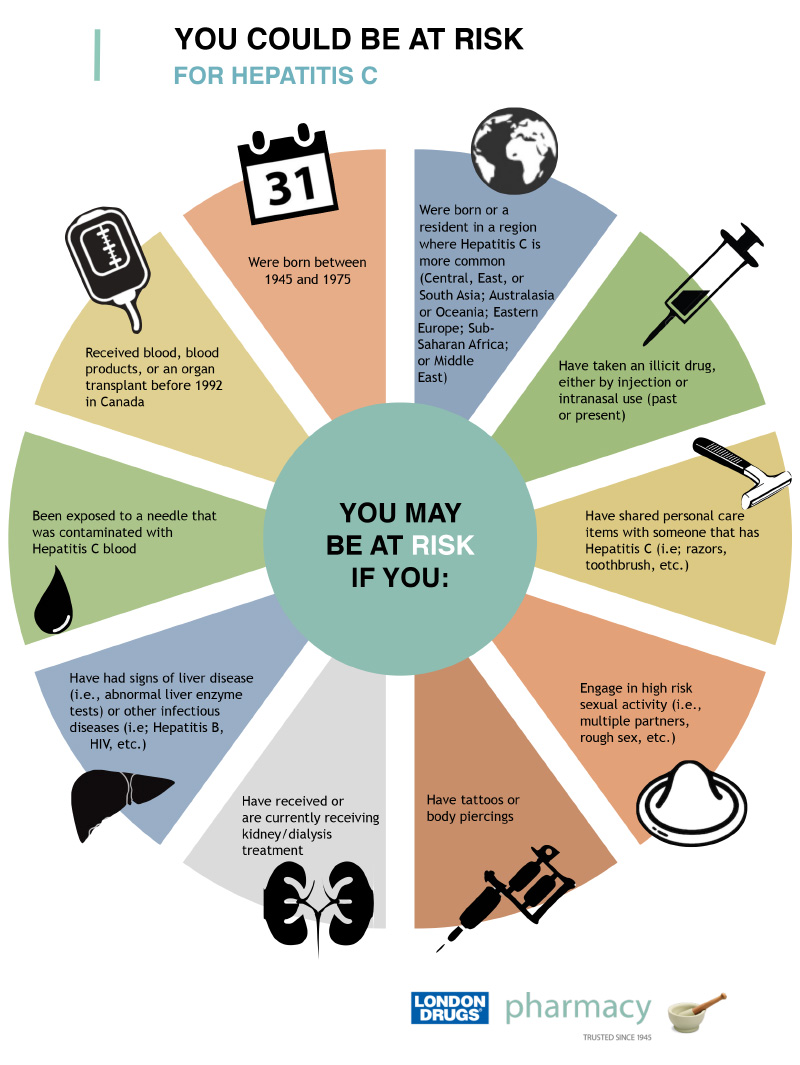With Hepatitis C Screening by a London Drugs Specialty Pharmacist or Nurse
It is estimated that 250,000 to 400,000 Canadians have Hepatitis C. The Canadian Association for the Study of the Liver recommends that all individuals born between 1945 and 1975 be tested and screened for Hepatitis C.
Our pharmacists and nurses have been trained to perform the OraQuick® HCV Rapid Antibody Test Kit and provide one-on-one counselling on Hepatitis C, explanation of results, and how to handle positive results. The screening test result will be shared with your doctor or other primary care provider (when available and requested) and London Drugs pharmacists and nurses will help those with a positive result to receive further testing and necessary treatment by a liver specialist. London Drugs pharmacy team will provide support throughout the journey to cure with multiple touch points.
Acute hepatitis occurs within the first six months following exposure to HCV. Approximately 15%-25% of infected individuals will be able to clear the virus from their bodies. The other 75%-85% who become infected will develop chronic hepatitis C, which can lead to serious liver disease.
About 70%-80% of the people who are infected with HCV do not develop symptoms. Those who do develop symptoms generally do so between 2 and 12 weeks following exposure.
When symptoms occur, they may include:
abdominal pain
clay-coloured bowel movements
dark urine
fatigue (constant tiredness or weakness)
fever
jaundice (yellowing of skin or whites of eyes)
joint pain
loss of appetite
nausea
vomiting
Of the people who develop chronic hepatitis, 5%-20% will develop cirrhosis (severe scarring of the liver) over a 20 to 30-year period. With each passing year, up to 6% of chronic hepatitis patients will develop liver failure, and up to 5% will develop liver cancer.
There are several treatment regimens available for chronic hepatitis C, and the cure rate is over 95%.
The primary route of transmission of the hepatitis C virus (HCV) is through blood-to-blood contact with an infected person or product.
You could be at risk for Hepatitis C, if you:
were born between 1945 and 1975
were born in or are a resident of a region where hepatitis C is more common (i.e., Central, East, or South Asia; Australasia or Oceania; Eastern Europe; Sub-Saharan Africa; or North Africa/Middle East)
received blood, blood products, or an organ transplant before 1992 in Canada
Have ever been stuck with a needle that had been exposed to hepatitis C positive blood
have had signs of liver disease (i.e., abnormal liver enzyme tests) or other infectious diseases (i.e., hepatitis B, HIV, etc.)
have received or are currently receiving kidney/hemodialysis treatment
have any tattoos or body piercings
engage in high-risk sexual activity (i.e., multiple partners, traumatic or rough sex, etc.)
have shared personal care items with someone who has hepatitis C (i.e., razors, toothbrush, etc.)
have taken an illicit drug, either by injection or intranasal use (past or present)

Ask your London Drugs pharmacist about Hepatitis C screening today. Together, we can eliminate Hepatitis C.
References:

© 2026 London Drugs. All rights reserved.